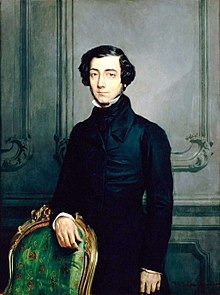French sociologist as well as political theorist Alexis de Tocqueville (1805 1859) traveled to the United States in 1831 to learn its prisons and returned with a wealth of broader observations that he codified in “Democracy in America” (1835), probably the most important publications of the 19th century. With its trenchant observations on individualism and equality, Tocqueville’s work is still an invaluable reason of America to Europeans and of Americans to themselves.
 Alexis de Tocqueville was born in 1805 into an aristocratic family members not too long ago rocked by France’s groundbreaking upheavals. Both of his parents had been jailed during the Reign of Terror. After attending university in Metz, Tocqueville learned law in Paris and was appointed a magistrate in Versailles, exactly where he met the future wife of his and befriended a fellow lawyer called Gustave de Beaumont.
Alexis de Tocqueville was born in 1805 into an aristocratic family members not too long ago rocked by France’s groundbreaking upheavals. Both of his parents had been jailed during the Reign of Terror. After attending university in Metz, Tocqueville learned law in Paris and was appointed a magistrate in Versailles, exactly where he met the future wife of his and befriended a fellow lawyer called Gustave de Beaumont.
In 1830 Louis Philippe, the “bourgeois monarch,” got the French throne, as well as Tocqueville’s career aspirations were temporarily blocked. Not able to advance, he and permission was secured by Beaumont to hold out a research of the American penal system, as well as in April 1831 they set sail for Rhode Island.
From Sing Sing Prison to the Michigan woods, from New Orleans to the White House, Beaumont and Tocqueville traveled for 9 months by steamboat, by stagecoach, on horseback as well as in canoes, traveling to America’s penitentiaries and a great deal in between. In Pennsylvania, Tocqueville invested a week selecting each prisoner in the Eastern State Penitentiary. In Washington, D.C., he called on President Andrew Jackson during visiting hours and exchanged pleasantries.
The travelers returned to France in 1832. They quickly released the report of theirs, “On the Penitentiary System in the United States as well as The Application of it in France,” written mostly by Beaumont. Tocqueville set to focus on a broader evaluation of American society and politics, released in 1835 as “Democracy in America.”
As “Democracy in America” disclosed, Tocqueville thought that equality was the wonderful political and social thought of the era of his, and he believed that the United States provided the most complex instance of equality in motion. American individualism was admired by him but warned that a society of people can readily become atomized and paradoxically consistent when “every citizen, simply being digested to each of the rest, is actually lost in the crowd.” He sensed that a society of people lacked the intermediate community structures – such as for instance those provided by standard hierarchies – to mediate associations with the express. The effect might be a democratic “tyranny of the majority” where specific rights had been compromised.
Tocqueville was impressed by a lot of what he noticed in American way of life, admiring the balance of its economy and asking yourself at the acceptance of its churches. Also, he observed the irony of the freedom loving nation’s mistreatment of Native Americans and its embrace of slavery.
In 1839, as the next volume of “Democracy in America” neared publication, Tocqueville reentered political life, serving as a deputy in the French assembly. After the Europe wide revolutions of 1848, he serviced briefly as Louis Napoleon’s foreign minister before being forced out of politics once again when he refused to help Louis Napoleon’s coup.
He retired to the family estate of his in Normandy and started creating a history of contemporary France, the very first volume of that was printed as “The Old Regime as well as the French Revolution” (1856). He blamed the French Revolution on crisis among the nobility as well as on the political disillusionment of the French public. Tocqueville’s plans for later on volumes had been cut short by the death of his from tuberculosis in 1859.
Get an affordable life experience degree at http://www.asian-europeanuniversity.com
Article Source: https://EzineArticles.com/expert/Martin_Hahn/22709


